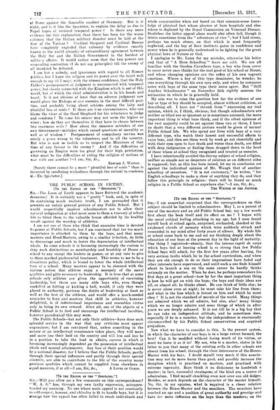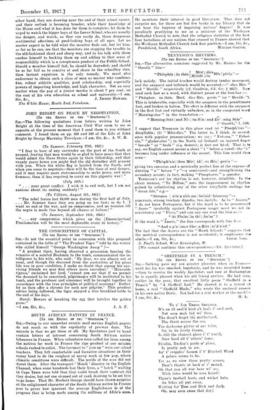(To THE EDITOR. OP rut " SPELTATOR."3 SIR.—I am somewhat
surprised that the correspondence on this subject should be limited to schoolmasters. May I, as a parent of one of the masters and an old Public School boy, say a few words first about the book itself and its effect on me ? I began with the usual critical feeling attaching to my age, but I soon found myself back at echool again, surprised, enchanted, shocked at the awakened chords of memory which were suddenly struck and resounded in my mind after forty years of silence. My whole life at school came back to me and net me thinking deeply about the education of our boys at the present day in the light of maturity. One thing I registered—ffilmely, that the intense esprit de corps which boys feel at leaving school is no strong that few Publio School boys will admit, for the first few years after leaving, the very serious faults which lie in the school curriculum, and when they are old enough to do as their impressions have faded and other interests have supervened, and until such a one finds hinseelf about to launch a son on the some career he hardly thinks seriously on the matter. When he does, he perhaps remembers his first days at a great school—how by far the most important thing is how he will get on with the boys; the boys and their ideas are all, or almost all, he thinks about. He can think of little else; he is never alone even at night; he must take his line from them; and what is the line which is forced on him and which he must obey ? It is not the standard of morals of the world. Many things are admired which we all admire, but also, alas! many things which we no longer admire and some things of which in after years we are deeply ashamed. It is not till he is a big boy that he can take an independent attitude, and he sometimee does, especially if he is a monitor, but the independence is enormously circumscribed by his Public School conservatism and acquired prejudices.
Now what we have to consider is this. Is the present system, in which the character of our boys is to a large extent formed, the best? Can it be modified without losing much of its virtue, or must we leave it as it is? My son, who is a master, states in his letter to you that many of the existing evils in other schools are absent from his school, through the close intercourse of the House. Master with his boys. I doubt myself very much if this associa- tion may not do more harm than good, and possibly increase the deception which is practised on masters, and practised with extreme ingenuity. Boys think it no dishonour to hoodwink a master; in fact, successful stratagems of the kind are a source of admiration. I find myself chuckling even now over our old dodges. Besides, so much depends on the character of the master himself. No, Sir, in any opinion, what is required is a closer relation between the House-Master and the monitors. The monitors have reached an age and a position of great authority and prestige and have far More influence on the boys than the masters; on the other hand, they are drawing near the end of their school career, and their outlook is becoming broader, while their knowledge of the House and what it has done for them is complete; let them be urged to watch the bigger boys of the Lower School, who are usually the danger, and watch, as they ran easily do, those dangerous sentimental affections of good-looking boys of all ages. Let no master expect to be told what the monitor finds out, but let him, as far as he can, see that the monitors are stopping the trouble in the old-fashioned short and sharp way, and in his talk wills them confine himself to backing them up and adding to that sense of responsibility which is a conspicuous product of the Public School. Should a monitor himself fail, he should be degraded; and should be so far fail as to connive at and share in the schoolboy sins, then instant expulsion is the only remedy. We must also endeavour to obtain such a class of man as master who combines fine, robust athletic qualities, good scholarship, and especially powers of imparting knowledge, and high character. Not an easy matter when the pay of a junior master is about 7 per cent. on the cast of his own education at school and university.—I am,
Sir, itsc., J. ERNEST HOWARD. The White House, Heath End, Farnham.



































 Previous page
Previous page